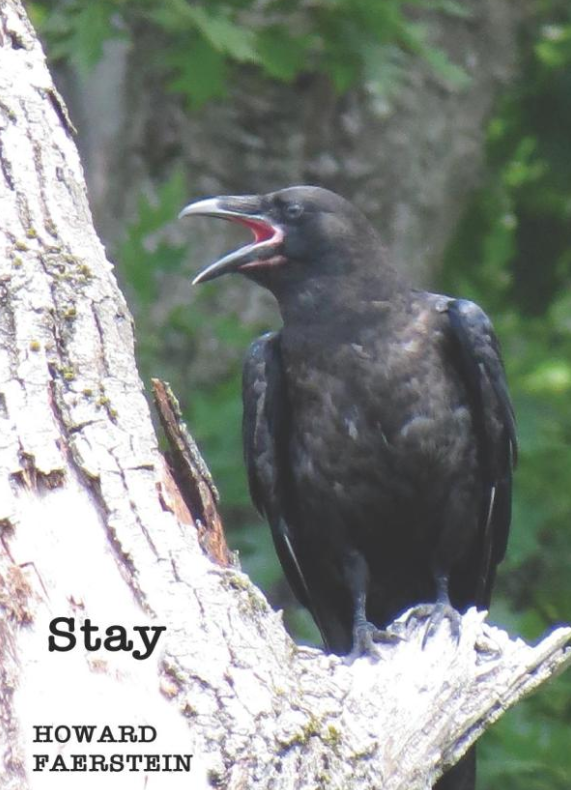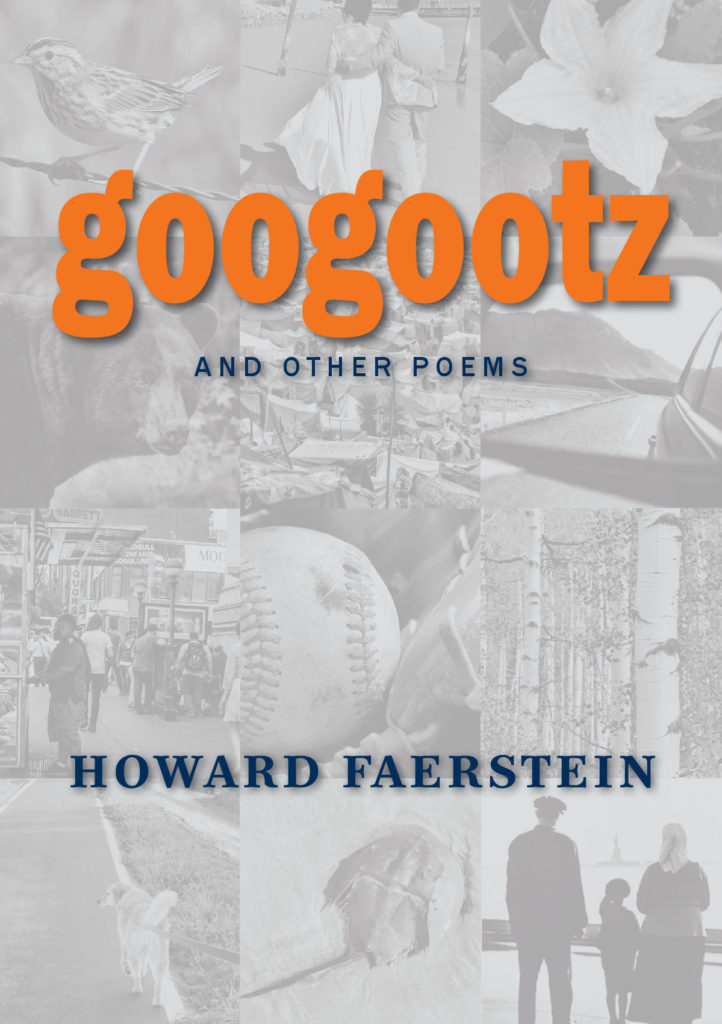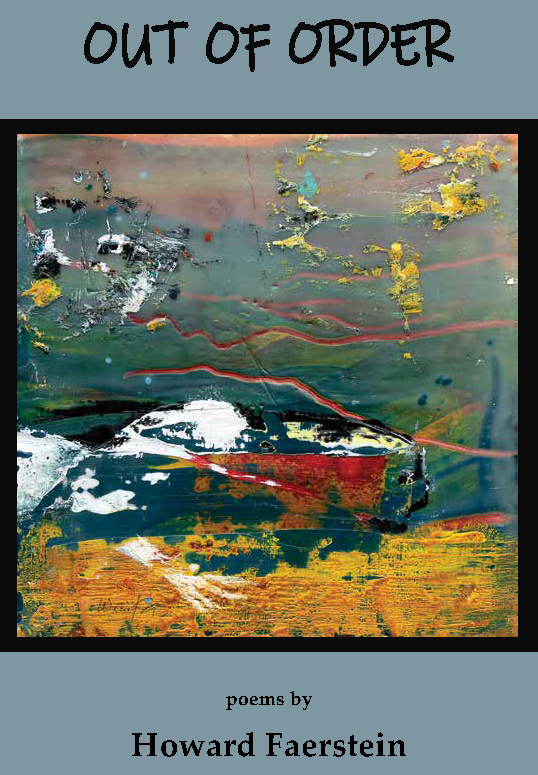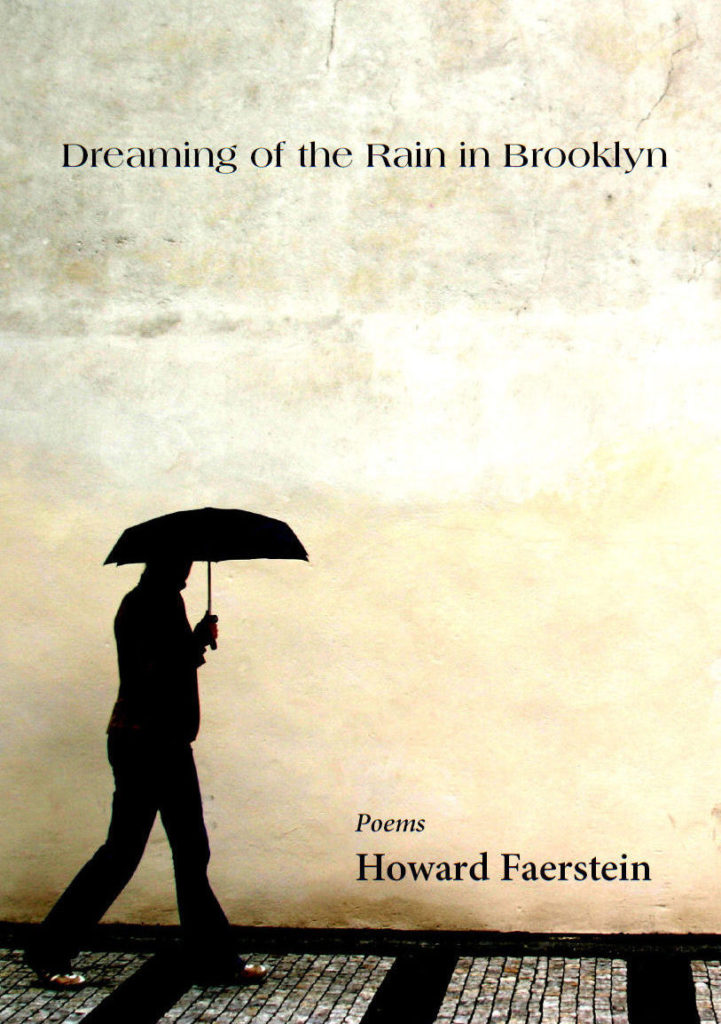Praise for Googootz and Other Poems
In Googootz and Other Poems Howard Faerstein meets the world with unabashed frankness and an intelligence both empathic and zapping. “Three generations from now/will the wren wheedle still?/ Will wasps gorge on fallen fruit?” the poet wonders amid the ruinous violence (including that sprung from racism, classism, and homophobia) we inflict on others and ourselves. Carl Sagan’s suggestion that “for small creatures such as we, the vastness is bearable only through love” seems particularly relevant in times like ours when, as Faerstein insists, “misery like rapture ascends/as quickly as frost in mid-spring.” The poet’s heartache for the world’s raw wounds is as intense as his unflinching love for its shards of beauty. We might as well “wrap/gauze around the whole/bloody planet,” the poet grieves, while also urging us to celebrate the feverfew “growing out of the gutter,” the “sibilant warbling/of the dead,” the hatchlings of the macheted terciopelo “spreading out/ in the early light/ like stars/ blinking forth/ at dusk.” Like the luscious googootz, Faerstein’s voice nourishes and surprises. Savor it to the max and share.
Mihaela MoscaliucAuthor, Immigrant Model and Father Dirt
The poems in Howard Faerstein’s Googootz journey by their own inimitable logic, finding their way as they go, because “you keep travelling on/ whether life invites you or not.” In this wide-ranging volume of praise and protest, subtle humor and elegy, finches fly through fire, Hiroshima shadows a New England beach, space aliens reveal a secret connection to spaghetti and meatballs, a wasp and wind chimes conjure mystery “outside the borders of definition,” and seemingly respectable citizens harbor “cavernous hate camouflaged like terrorist conviction.” Even as Faerstein confronts the worst of our current moment, these poems “never refuse love’s lure,” never forget “the great glory” of creation. Googootz is a large-souled book that gives courage to “go on living.
Jay UdallAuthor, The Welcome Table and Because a Fire in Our Heads, winner of the X. J. Kennedy Prize
An earthy atmosphere saturates the poems in Howard Faerstein’s recently released collection of poetry, “Googootz and Other Poems’’ (Press 53). Faerstein, a retired adjunct professor, opens doors into the small secrets, the quotidian beauties. The Florence resident writes of “new moon tides,” “knots and nests,” “a colony of adder tongues,” the “soft wallow of time. Set in a northeastern landscape of marsh and highway, beach and garden, in Provincetown, Brooklyn, where he was born and raised, and Berkshire County, places where he’d “seek/ in those linen banks of egret/ a counterpoint to Hell.” Faerstein’s first collection appeared in 1977, a second about 35 years after that, and Googootz marks a welcome third.
Nina MacLaughlinNew England Literary News | Boston Globe
Praise for Out of Order
Reader, prepare to be transported by the range of subject and sentiment evoked by the poems in Out of Order. From glaciers, Cossacks, and 17th century Paris to present day “falsifiers” and New York jazz clubs, Howard Faerstein’s curious mind and sardonic voice question, riff and deep-dive with associations that will leave you breathless. With a naturalist’s eye for detail and a musician’s ear for rhythm, Faerstein crafts language that is crisp and fresh: “the downbeat of rain,” “the succor of stubble corn,” “a kingfisher’s rattling call.” In a prose poem that fuses bird banding and a Bukowski poem, the bander’s job is “Neither conceptual nor imitative/Not just poetry blather.” In another, a father’s regret is “like an unsuspecting farmer raking his second cut,/nesting bobolinks screeching in the dew-drenched field.” Echoing both Whitman and Ginsburg, Faerstein’s poems hold the wonder and sorrow of personal and collective history, yet always embrace the earth, our beating hearts
Gail ThomasAuthor, Odd Mercy and Waving Back
Like a geologist, Howie Faerstein drills deep: past the moment, past memory, past the past itself. It’s as though he has coined his own language, one that tells us who we were, who we are, who we will be if only we open ourselves to the world as he does. His lines are like jazz riffs, saying things that we haven’t heard before, that can’t be said any other way.
David KirbyAuthor, More Than This
The matter in Howard Faerstein’s Out of Order ranges from enormities: “even as cardboard coffins are left in the streets of Guayaquil” to intimacies: “Her room slightly bigger than a casket.” Faerstein’s is a poetry that deftly and gently realizes the remarkable that inheres in the ordinary: “radishes can grow anywhere” or “has always been / wood enough / expect there always / will be.” Out of Order is life railed against, accepted, sometimes celebrated.
Allen BrafmanAuthor, Wherever I Look I Am Not There
Praise for Dreaming of the Rain in Brooklyn
In the voice of Howard Faerstein we hear the voice of Whitman—the original Brooklyn poet—and the voice of Ginsberg, but above all the voice of experience. Faerstein has seen it all, and these poems are the stuff of life itself. He bears witness to the madness of gamblers at a betting parlor, and the greater madness of a draft induction center during the war in Vietnam. He remembers the hallucinations of the 1960s, drug-induced and otherwise. He recalls the dead of Coney Island and 42nd Street, and the missed opportunities of family. He invokes the memory of friends who died young. He knows the sights and sounds of New York late at night, but also New Mexico in the light of day. He knows trees, birds and music (especially jazz). These are poems that startle us with their revelations and juxtapositions: a birding expedition stumbles across the grave of a poet; a surreal exploration of doo-wop leads us to Fidel Castro at the United Nations. Faerstein is a poet of hard-earned wisdom, of courage and compassion, unafraid to confront mortality or express the emotions we call love, and he does it all in a language that is visceral and vivid. Forget the poets of the new, hip, trendy Brooklyn; the true poet of Brooklyn is right here, right now, in these pages. Read on.
Martín EspadaAuthor, The Trouble Ball
Whether it's the corners of Brooklyn, or the Four Corners of the American West, Howard Faerstein inhabits his piece of the planet. His poems are as alive with celebration and beauty, as they are with failure and death, where "ruined things are at the heart and the melody/ will say it all." With a jazz ear and an eye for things in flight, he travels distances of geography and memory. He says "Nothing has stopped me." These poems pulse with tenderness, life-force, and a gratitude to all things living.
Anne Marie MacariAuthor, She Heads Into the Wilderness
Dreaming of the Rain in Brooklyn marks the debut of a poet of deep feeling, one who filters the “pear light of hope” through daily existence and who recognizes each “odd hour… pressed by love.” In poems resplendent with “creation’s frenzy,” with jazz, lovers, and “Noah’s lucky ones,” those creatures great and small, Howard Faerstein acknowledges a world, past and present, that remains “wonderful even with death.”
Michael WatersAuthor, Gospel Night
Howard Faerstein is one of America's true voices caroling. He's a rambling man and a gardener. Does he contradict himself? Very well then, he contradicts himself. Listen, if you love Brooklyn, or New Mexico, or New England, or '50's pop music, or '60's controlled substances, or tales of the immigrant ancestors, or migrating osprey--if you love "redwings flying through late March snow" or "the irreconcilable dilemma of connection and solitude" (and who doesn't?)--you will love and cherish this ironic and tender book just the way I do.
Alicia OstrikerAuthor, The Book of Seventy
Earthy and savvy, hungry and rueful, Howard Faerstein’s poems have an ear for the vernacular and an eye for the unsolvable. His offbeat America, from Brooklyn to the Southwest, is a place of ruin and hope, as full of heart and surprise as a jazz solo. He takes us to “all the bad parts of town,” where the enduring itches of body and soul keep finding their way into fresh song.
Joan LarkinAuthor, My Body: New and Selected Poems



